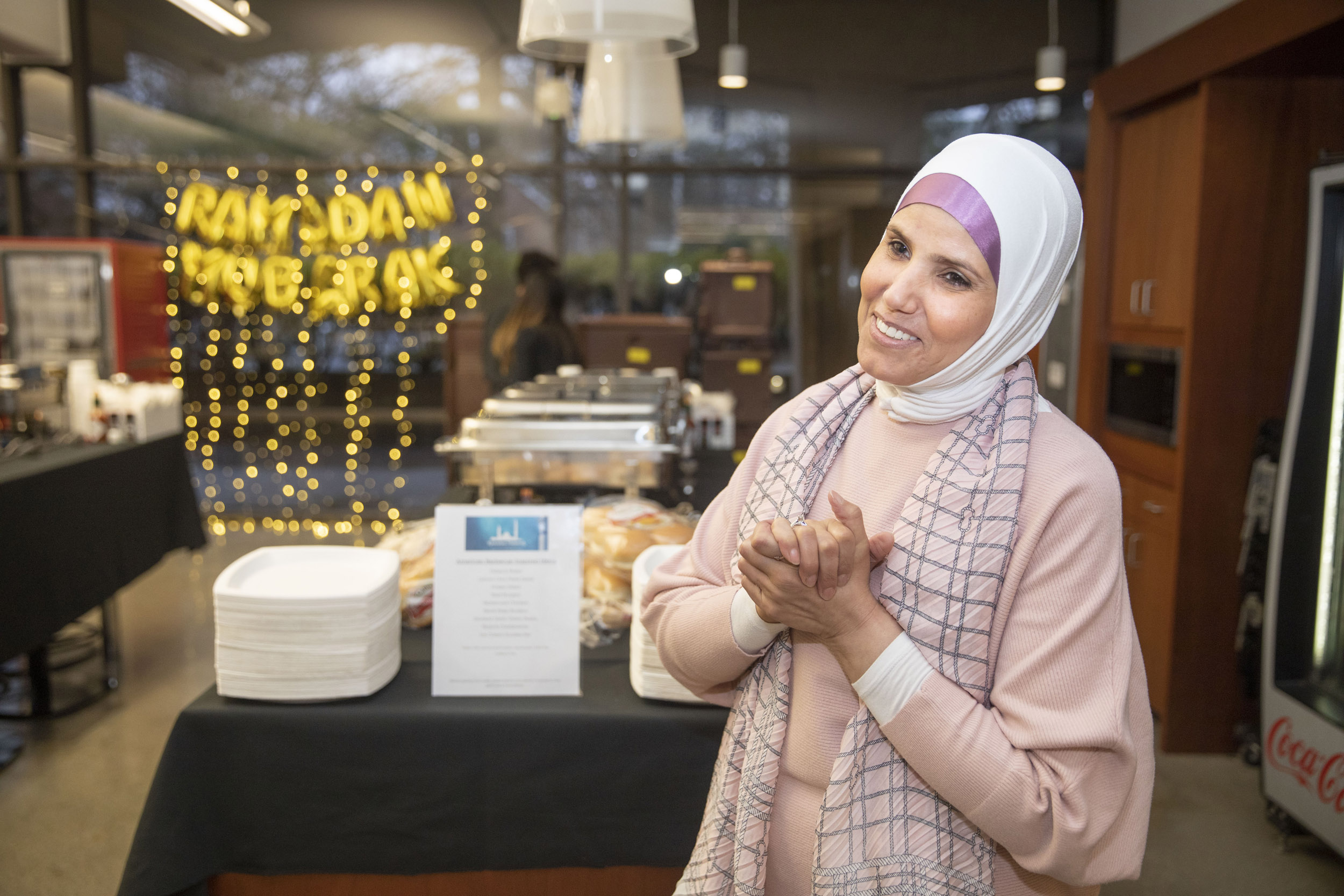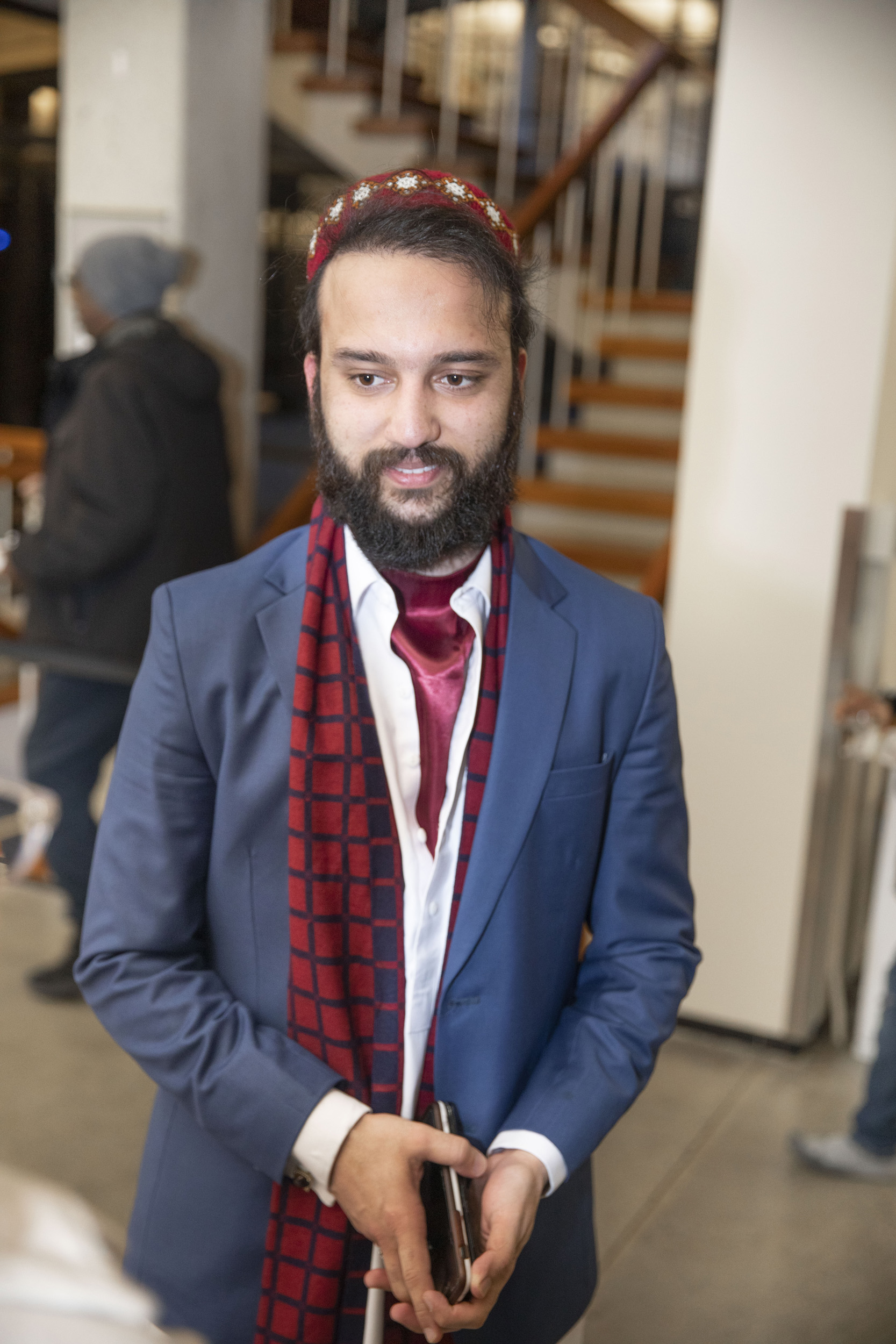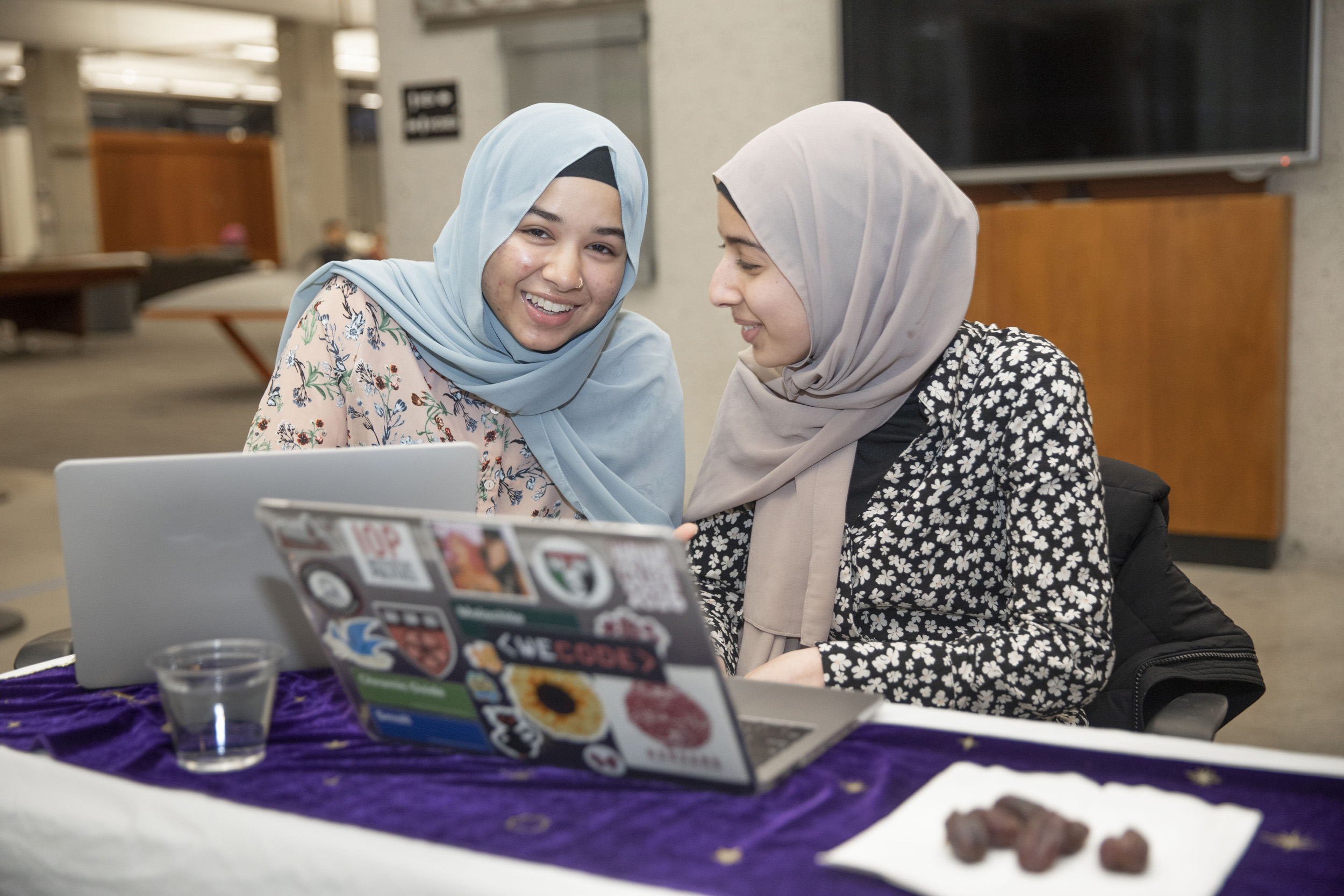
Muslim chaplain Samia Omar hosts iftar, a dinner breaking the daily Ramadan fast. Iftar is held nightly at the Student Organization Center at Hilles.
Photos by Kris Snibbe/Harvard Staff Photographer
Purifying body and mind, building community
Muslim chaplains, Dining Services join to create multicultural iftar dinners to mark end of day of fasting, reflection for Ramadan
Children run around laughing and squealing as dining services staff and student volunteers ready the final details of last Friday’s iftar dinner, marking the end of another day of fasting for Ramadan. For a second year the University’s two Muslim chaplains are working with Harvard University Dining Services and its Crimson Catering division to cater the meal, which is served after sunset during the monthlong religious celebration.
Imam Khalil Abdur-Rashid leads evening prayers as students, faculty, staff, and family begin to file in. Many grab dates and water to officially break their daylong fast. After prayers, which are held at the Student Organization Center at Hilles, everyone dives into the meal. Tonight, it’s American BBQ dishes, including beef burgers and potato salad.
“Ramadan is very much a time of community and of blessings and of sharing love and happiness and all of those good things with everybody,” said Reem Ali ’23. During Ramadan, an estimated 1.9 billion Muslims worldwide fast from sunrise to sunset as a way to purify body and mind to create a deeper connection to God and join others in community. It marks the descent of the word of God, the Quran, to the Earth and is one the central pillars of the faith.
Ali said the idea that fasting is difficult could not be further from the truth in her experience. “The whole concept is that this is something that you do together as a group to get closer to God and for it to be a spiritual experience for everyone,” the 21-year-old government concentrator said. “Community-building comes in that, and it’s so beautiful to see it all come together.”
Community-building is at the center of the campus iftars hosted by Abdur-Rashid and the first Muslim female chaplain, Samia Omar. In 2022, their office and HUDS joined forces with the Office of the President and the College to host iftars that served up to 350 students in the Cambridge campus, Smitha Haneef, HUDS’ managing director, said. This year, they expect to serve up to 500 participants. Ramadan, which takes place during the ninth month of Islamic lunar calendar, began on campus March 23 and will end April 22.
“It’s really magical because whenever we come all together, it actually reminds us of the iftars in our countries,” says Maha Hassan, an A.L.M. degree candidate at the Extension School who studies biology. The Egyptian mother of four said Harvard’s iftars reminded her of home, while also introducing her to Muslims from all corners of the world. She noted that community members are able to exchange experiences with each other while bonding over their shared religion.
That exchange of cultures and experiences is reflected in the daily menus, a joint effort by Omar and HUDS’ director of culinary operations Martin Breslin. Breslin called on Omar’s expertise to improve the authenticity of dishes from the Middle East, Turkey, Central and Eastern Asia, India, and Pakistan. Omar, who is from Egypt, helped HUDS source a variety of spices and taught chefs different techniques to properly cook meals that would remind Muslim students of home, such as Turkish moussaka.


Harvard Divinity School student Sultan Khan and Samia Afrose ’25 (left) and Rana Albaadani ’26 at the iftar dinner.
“The Harvard program for Ramadan turned the experience for Muslim students from suffering fasting all day, to be fun, something to celebrate and makes their fasting easier,” Omar said. The food options are diverse. On Saturdays, diners are treated to a “chef’s special,” which includes meals from India, Greece, Italy, and Portugal.
Dozens of student volunteers help with setup, check-in, crowd control, and cleanup, Abdur-Rashid and Omar said. Sultan Khan, a second-year M.Div. student at Harvard Divinity School, said he felt called to help again after last year. He joked with Abdur-Rashid that he was back to replenish his barakah, or “blessings,” for the year after Ramadan.
“It’s that sense of commitment and service to the whole community,” he says. “We have not had this experience, and we want new members coming in, freshmen or people who are starting new programs, to have that welcoming, empowering grounding in our community.”
The efforts have also inspired some undergrads to work together to provide predawn meals known as suhur for other students preparing to fast for the day. Ali and her suitemates send out a weekly Google form to all undergraduates who want a pre-fast meal and then spend the hours after nightly prayers cooking.
This year they received support from Leverett House to fund the meal. HUDS also provides students with essentials they can use to prepare predawn meals, including eggs, diced vegetables, chicken and plant-based sausage, fresh fruit, breads, pastries, and juice.
“This is one piece that is very unique, and it’s available for the whole community to experience what it means to be diverse and inclusive, and how to foster belonging, which is not just about food but it is really about community,” Abdur-Rashid said of the Ramadan programming. “It’s feeding the souls of people, and feeding their bodies, and feeding their minds and their spirits. All of that is representative of the direction that Harvard is moving into.”




